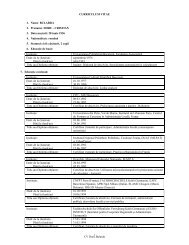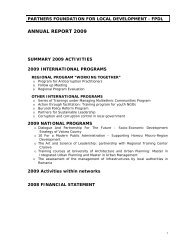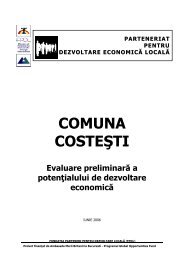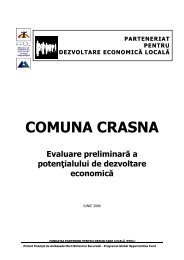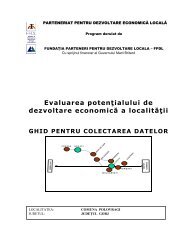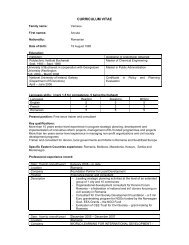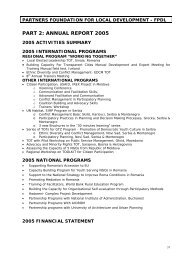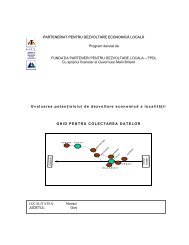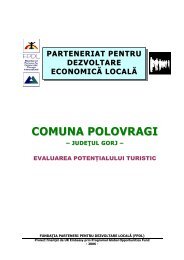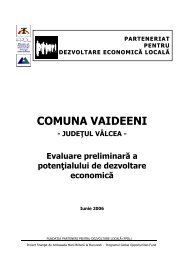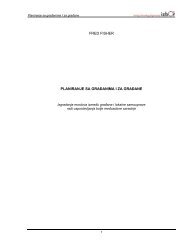Organizational Development: A Manual for Managers and ... - FPDL
Organizational Development: A Manual for Managers and ... - FPDL
Organizational Development: A Manual for Managers and ... - FPDL
Create successful ePaper yourself
Turn your PDF publications into a flip-book with our unique Google optimized e-Paper software.
Part 1<br />
Introductory theoretical framework<br />
The very term audit comes from Latin audio, <strong>and</strong> refers to a hearing of oral evidence. Nowadays,<br />
the term became common in modern English <strong>and</strong> many other languages in a sense of “inspection,<br />
correction, <strong>and</strong> verification of business accounts by a qualified accountant” or, in a more general<br />
interpretation, it means, “to inspect, correct, <strong>and</strong> certify (accounts, etc.)” (The New Collins<br />
Dictionary <strong>and</strong> Thesaurus, 1991).<br />
Allan J. Sayle, one of the leaders in the field, who has been acknowledged as a pioneer of “valueadded<br />
auditing” gives the following explicit definition:<br />
“A management audit is an independent examination of objective evidence, per<strong>for</strong>med by<br />
competent personnel, to determine:<br />
a) Whether or not the auditee:<br />
• Is assisting or is capable of assisting the company to achieve its policies <strong>and</strong> objectives.<br />
• Is capable of or is assisting the company to fulfill its contractual <strong>and</strong> legal obligations.<br />
• Has integrated management systems to do so.<br />
• Is effectively implementing those systems.<br />
• Could eliminate avoidable costs <strong>and</strong> continuously improve.<br />
And b)<br />
• The risk of continuing present practices in tomorrow’s world.<br />
• The probable efficacy of planned strategies, practices, systems in preventing avoidable loss.<br />
It is also:<br />
• The true <strong>and</strong> fair presentation of the results of such examination.<br />
… Audit is a fact gathering exercise <strong>and</strong>, when conducting audit, it is vital constantly to remember<br />
that one’s aim is:<br />
FACT FINDING, NOT FAULT FINDING.<br />
… Everybody in organization has a product. Everybody in organization is responsible <strong>for</strong> the<br />
quality of his or her product, as well as the costs they incur, <strong>and</strong> must, there<strong>for</strong>e, manage both their<br />
own work <strong>and</strong> themselves properly. Effectively this means that everyone is a manager, regardless<br />
of whether staff control comes under their delegated responsibilities. … The independent audit,<br />
there<strong>for</strong>e, serves the needs of people at all levels since it provides them with in<strong>for</strong>mation<br />
concerning their management of their work.” (Allan J. Sayle, Management Audits, 1997, p. 11)<br />
Although this definition was, probably, made having in mind business “<strong>for</strong> profit” organization, most<br />
of the ideas are fully applicable to local governments.<br />
Any local government has certain managerial capacity to govern, <strong>and</strong>, consequently, more or less<br />
limited ability to ensure that declared policies <strong>and</strong> objectives are achieved, <strong>and</strong> all legal <strong>and</strong><br />
contractual obligations are fulfilled. Thus, the match of capacity with the scope of responsibilities is<br />
a legible point <strong>for</strong> the audit. Are they able to do what they must do? Although in most cases local<br />
officials complain about national legislation, budget deficiency <strong>and</strong> other external limitations, they<br />
often fail to do, or do well enough, things that nobody <strong>and</strong> nothing prevent them from doing, or do<br />
better – they just cannot manage this.<br />
On the other h<strong>and</strong>, having considerable managerial capacity does not automatically means using<br />
it. Local administration operates under the supervision of politicians <strong>and</strong> central governments. Any<br />
managerial actions may have the impact to the services provided to the public, but not only.<br />
Political <strong>and</strong> other administrative consequences may be also considerable. We have witnessed in<br />
some local governments that management does much less then it is able to do, being paralyzed by<br />
contradictory <strong>and</strong> risky political environment, or inappropriate control from central government<br />
institutions. Although we do not consider political environment <strong>and</strong> government’s behavior as the<br />
object <strong>for</strong> management audit, the audit itself can help to determine the difference between the<br />
167



